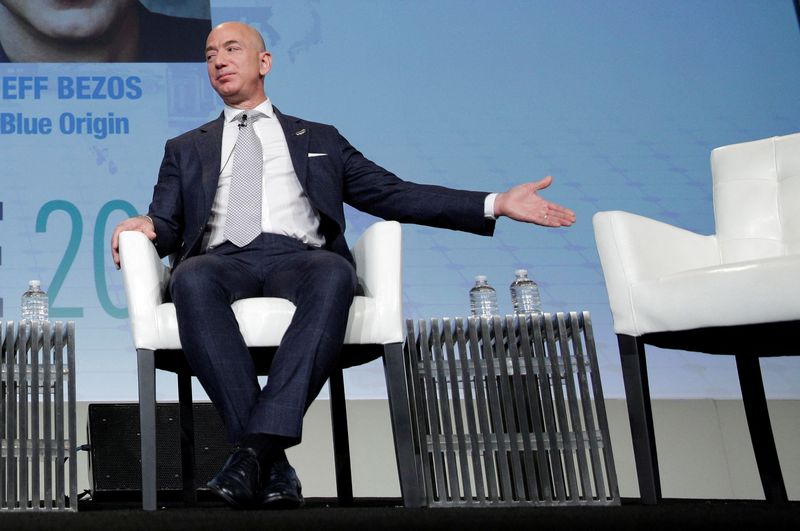Bezos taps Amazon vet to speed up space company Blue Origin
2023.12.21 10:14

© Reuters. FILE PHOTO: Jeff Bezos, founder of Blue Origin and CEO of Amazon, speaks about the future plans of Blue Origin during an address to attendees at Access Intelligence’s SATELLITE 2017 conference in Washington, U.S., March 7, 2017. REUTERS/Joshua Roberts/Fil
2/3
By Joey Roulette
WASHINGTON (Reuters) – An Amazon (NASDAQ:) veteran tapped by Jeff Bezos to lead Blue Origin aims to pull from the e-commerce giant’s speedy manufacturing playbook to give the space company’s rocket launch and moon lander business a badly needed boost against Elon Musk’s SpaceX.
Top priorities for Dave Limp, who led Amazon’s lucrative devices unit, include accelerating development of Blue Origin’s long-delayed New Glenn rocket and production of its powerful BE-4 engine, according to two employees who attended the new CEO’s company-wide meeting this month.
Drawing comparisons with Amazon’s customer-centric sales ethos, Limp stressed the importance of meeting schedule deadlines, said the employees, who asked not to be identified discussing the internal meeting. Limp also suggested placing greater focus on integrating software and artificial intelligence in manufacturing.
Blue Origin declined to make Limp available for an interview and did not respond to questions for comment. On his first day on the job on Dec. 4, Limp said on a LinkedIn post that he was “excited to get started.”
Limp is seen as a trusted Bezos deputy capable of helping push Blue Origin through the final, complex stages of developing the heavy-lift New Glenn rocket, the company’s long-delayed key to Earth’s orbit and main challenge to SpaceX’s dominant Falcon 9.
The clock is ticking as customers, such as Amazon’s satellite internet unit Kuiper, wait to fly on New Glenn, which is critical to Blue Origin generating meaningful revenue.
Limp is taking cues from his boss.
“Blue Origin needs to be much faster, and it’s one of the reasons that I left my role as the CEO of Amazon a couple of years ago,” Bezos said last week to podcaster Lex Fridman.
Bezos changed Blue Origin’s senior leaders and reorganized its business units to shake it out of a development gridlock that has existed since the last time he installed a new CEO in 2017.
VAST FOOTPRINT
Though it has yet to reach orbit, Blue Origin’s industry footprint is vast. Limp will also oversee plans to build a moon lander for NASA, an orbital space station and a business centered on maneuverable servicing and refueling satellites.
He will also lead the restart of Blue Origin’s suborbital space tourism and research business as its only active rocket, the small, reusable New Shepard, returns to flight from a 15-month grounding.
Limp, who also worked at Apple (NASDAQ:) for nearly a decade, brings a fresh face where the popularity of Blue Origin’s former CEO waned among staff, several current and former employees said.
Limp’s predecessor, Bob Smith, oversaw the start of New Shepard’s launch campaign, which sent Bezos himself to space in 2021. Smith also led Blue Origin through a legal battle to win its multibillion-dollar moon lander contract from NASA.
But mounting delays with New Glenn and its BE-4 engine largely spurred the change in leaders, several employees said.
Smith could not be reached to comment.
In Earth’s orbit, competitive pressure is mounting. SpaceX has launched multiple astronauts and nearly 100 missions to orbit this year with its Falcon 9. Musk is vowing to upend the global launch market with cheaper rides to space on SpaceX’s fully reusable Starship.
And NASA is pushing for speed in its Artemis moon program, where Blue Origin’s lunar lander concept will be a second ride for astronauts to the moon’s surface after SpaceX’s Starship.
“They need to get their act together, they need to deliver,” said George Sowers, a space industry consultant who worked with Blue Origin as an executive at United Launch Alliance (ULA), a joint venture of Boeing (NYSE:) and Lockheed Martin (NYSE:).
“They’ve had the luxury of not having to make a profit to survive, because Bezos has been funding them,” Sowers said. “But at some point that’s not a sustainable model.”
Blue Origin is selling BE-4 engines to ULA, a rival that has long dominated the market for launching Pentagon satellites to space. ULA is relying on timely BE-4 deliveries for its next-generation Vulcan rocket.
Blue Origin may be interested in buying ULA. It has expressed interest in such a deal in the past, according to two people familiar with the matter who asked not to be identified. The Wall Street Journal on Thursday reported that Blue Origin, private equity firm Cerberus and Textron (NYSE:) have shown interest in an acquisition.







